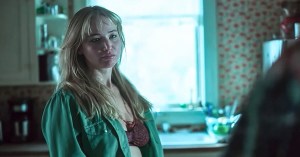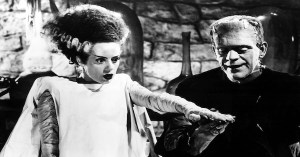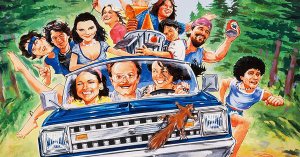Daddy Issues Fuel The Umbrella Academy’s Weird Superhero Family
Series stars Ellen Page, Tom Hopper, Mary J. Blige, and more reveal the toxic environments that created Netflix's new superheroes.
When audiences discover The Umbrella Academy on Netflix, they will be introduced to a very different sort of superhero family. As actor Aidan Gallagher, who plays the time-lost Number Five, put it when Rotten Tomatoes spoke with the cast, “[The characters] are not seen at great heights.” Instead, the series focuses on the group, formerly a teen superhero team with fantastic abilities, at “rock bottom a lot of times.”
As in the graphic novel series by Gerard Way and Gabriel Ba upon which the show is based, the characters face the legacy of a choice made by their adoptive father Sir Reginald Hargreeves (Colm Feore). In the series backstory, a number of children were born at the same time on the same day despite the fact their mothers — themselves not connected in any way — had not been pregnant when the day began. Already a famous adventurer, Hargreeves tries to adopt these special children, and succeeds at collecting several of them. He surmised that they would have extraordinary abilities and prove instrumental in saving the world.
Click to view full image.
Spectacularly ill-equipped to raise children, Hargreeves failed to give them names; they would receive them after Number Five disappeared around age 12. Treating them as test subjects and then as tools to prop up his planned superhero team, Hargreeves left the children with serious cases of emotional neglect.
“On top of dealing with the emotional neglect and narcissism of the father, they are obviously going into extremely violent situations. So they have that added layer of insanity,” Ellen Page, who plays Vanya, noted when Rotten Tomatoes spoke with the series’ stars.
“They weren’t allowed to be kids,” explained Emmy Raver-Lampman, who plays Allison (formerly Number Three).
In lieu of “running around and scraping their knees,” the kids were subjected to rigorous training regimens to hone their abilities. Allison’s, for example, allows her to plant powerful suggestions in peoples’ minds. The situation only became worse as the kids reached an age at which Hargreeves could present them to the public as the Umbrella Academy.
“They also had the weight of the world on their shoulders,” Raver-Lampman said. “Being put in situations where they’re seeing horribly graphic stuff and doing very violent things to other humans at such a young age.”
Click to view full image.
Tom Hopper, who plays devoted son Luther (aka Number One) explained: “They’re all massively affected by their relationship with their dad.” As he continues to be loyal to Hargreeves when the series begins, he faces a great challenge when his father turns up dead: forcing the family to reunite for a funeral and an investigation into his death.
But all of the children, now adults (even Number Five, though he looks 12 thanks to some time-travel weirdness), must come to grips with the neglect and abuse Hargreeves inflicted upon them. It is part of the reason David Castañeda, who plays Diego (Number Two), has a hard time seeing Umbrella Academy as being anything like a traditional superhero show. “There was this [aspect] about child abuse,” he said. At it happens, Diego operates like traditional vigilante with police contacts and other familiar trappings. But unlike many other television vigilantes (and some members of the Academy), he accesses his emotions in a more open way.
Click to view full image.
“He’s very much outspoken in what he feels,” Castañeda said. “And he’s not afraid to kinda react on them.” His willingness to react brings him into conflict with the more closed-off Luther on many occasions.
Unlike Diego, Klaus (Number Four) numbs out the pain of the neglect (and the literal voices of the dead his ability allows him to hear) with copious amounts of drugs and alcohol. The dichotomy of a broken superhero attracted actor Robert Sheehan to the part.
“It’s much more interesting, I think, to show people who are supposedly super or have these allegedly super abilities couched in a very normal, familial, dysfunctional context,” Sheehan explained. “All the great comic books are abstract manifestations of existing human qualities. Super strength, invisibility, these are all emotional states you might say that have been abstracted. The show takes the focus off the ability and focuses on the emotional state that causes the ability.”
Click to view full image.
Of all the children, Vanya has the strongest claim that Hargreeves neglected her. Despite being born under the same circumstances as the others, Vanya never manifested powers. Consequently, Hargreeves isolated her from the other children, and she never became a number of the Umbrella Academy. But her pain goes deeper than just Hargreeves’ emotional neglect.
“Vanya has this extra layer in terms of just being ostracized by the whole family,” Page explained. “[She’s] just so profoundly isolated and constantly reminded that she wasn’t special, so she grows up with such a deep sense of worthlessness.”
When audiences meet Vanya, they will see someone who has internalized that isolation and witness the toll it takes on her — even as she is forced into contact with her family after many years.

Nevertheless, the sense that the characters were neglected as children permeates the series – even infecting the outlook of antagonists Hazel (Cameron Britton) and Cha-Cha (Mary J. Blige), a pair of time-traveling assassins with instructions to eliminate one of the Hargreeves clan.
“I think Cha-Cha is emotional neglect,” Britton joked.
“She was definitely neglected somewhere in her life,” Blige added.
And just as Umbrella Academy spins its heroes into survivors of childhood emotional neglect, its villains also face some serious soul searching during their latest mission. “How often do you have a bad guy like Hazel that doesn’t know who he is? Bad guys always know who they are,” Britton said. “They’ve always got that covered, but he’s mixed up and torn up and his only friend in the whole world, his only companion he could relate to in any way, is a f—ing sociopath.”
Click to view full image.
Though the characters face a tough battle in coming to terms with the neglect they suffered in the past, Umbrella Academy takes them on a journey with as much humor as melancholy. According to Sheehan, it reflects the “great conundrum of the tragicomedy of being alive.”
But was Hargreeves really the cruel and distant father his adopted children believe him to be?
“I feel like he imagined they would serve a purpose, which is one day save the world, and he doesn’t fool himself into thinking he has to love them to do that,” executive producer and showrunner Steve Blackman explained. “They are these special things, and he will train them and he will bring them to this place. But he’s forgotten that there’s emotions involved with these little kids, and he’s completely removed himself from that, to their detriment.”
Click to view full image.
Umbrella Academy co-creator Way had a different take on Hargreeves: “I don’t think he’s as much of a monster as he looks like,” he said. Though, with a moment’s reflection, he added, “he is and was a monster to those kids. That’s indisputable.”
And, perhaps, embracing that fact will allow the members of the Umbrella Academy (and Vanya) a space to heal – although Sheehan is convinced they will have to heal together.
“For better or for worse, these siblings are bonded together for life because they all went through a relatively similar emotional trauma that was unique to their family,” he said. “And I think the closest they can come to peace is when they’re together, which ultimately is sort of a catch-22 because they all remind each other of that dynamic and that trauma growing up. But they are emotionally strongest when they are facing the world together.”
Click to view full image.
The Umbrella Academy launches on Netflix on February 15, 2019.














